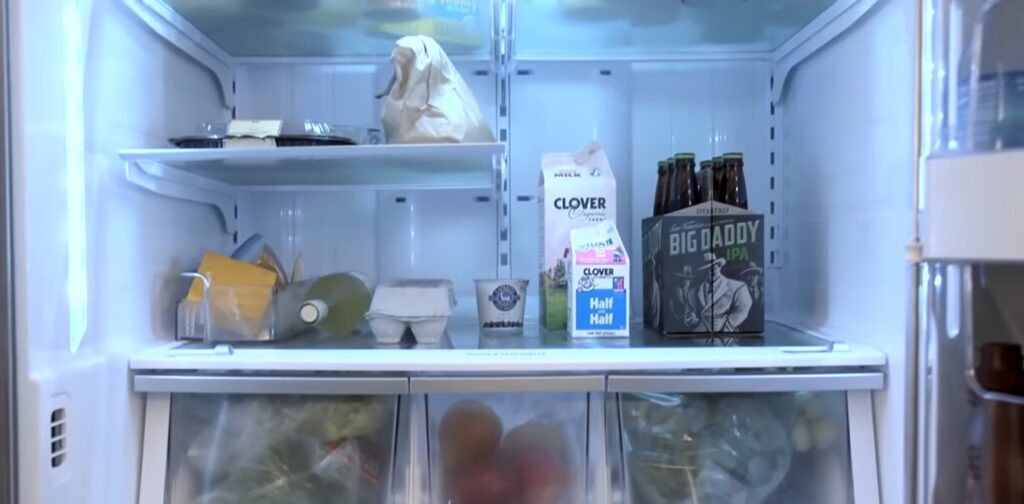This site is a participant in the Amazon Services LLC Associates Program. We are compensated for referring traffic and business to Amazon and other companies linked to on this site

Maintaining food safety and preventing food contamination, covering food left in the refrigerator appears as one of the basic behaviors. We often face questions about whether or not leftover foods should be covered and does this really affect our food safety and food quality.
This topic is of great importance in our daily lives, as it is related to our health and the sustainability of our food resources.
Covering leftover food in the fridge is a simple procedure, but it carries huge benefits for health and the environment. In addition to preserving food safety, covering foods contributes to preserving their flavor and quality, and prevents the transfer of unwanted odors inside the refrigerator.
It also reduces the possibility of bacteria growth and food transmission, which contributes to the promotion of general health and personal hygiene.
This post will explore the benefits of covering leftover food in the fridge and its importance in keeping our food safe.
We will discuss the positive effects of covering food on health and the environment, and provide some tips and advice for choosing and using appropriate covering methods.
My goal is to highlight the importance of this simple step and provide valuable information to our readers on how to respond.
8 Reasons why you should Cover leftover food in the refrigerator?
1-Food safety.
Taking care of food safety is vital to maintaining our health and general well-being. One of the important steps to achieve this is to cover the food left in the refrigerator.
When you properly cover and store foods, you protect yourself and your family from food contamination and preserve the quality of food. Below we will highlight some of the benefits of covering food in the refrigerator in terms of food safety:
Prevent food contamination:
Covering leftover food in the refrigerator protects it from contamination with harmful germs and microbes. When food is exposed to air and other odors in the refrigerator, bacteria can multiply and grow rapidly.
By covering food, you reduce the possibility of these germs and thus protect yourself from food poisoning.
2-Prevent contamination of the refrigerator.
When foods are left uncovered in the refrigerator, they are susceptible to contamination, bacterial spoilage, and unwanted odors.
Over time, this can lead to food deterioration and an increased risk of food poisoning.
Therefore, covering food left in the refrigerator is a necessary measure to keep the refrigerator clean and food safe.
One of the main benefits of covering food is preventing the transfer of unwanted odors between foods in the refrigerator. If foods are left uncovered, strong odors such as onions and garlic can transfer to other foods, causing them to change their taste and smell.
By covering the foods, these unwanted odors are prevented, which preserves the flavor of each type of food and maintains its high quality.
In addition, covering food reduces the possibility of bacterial growth and food transmission. Bacteria and microbes can multiply rapidly when food is uncovered in the refrigerator, and cause food poisoning and health problems.
By covering the food, it prevents bacteria from coming into contact with the air and other foods.
3-Preserving the flavor and quality of food.
Covering leftover food in the fridge plays a crucial role in preserving the flavor and quality of foods. When food is exposed to air, it is subjected to the effects of oxidation and loss of moisture, deteriorating its quality and altering its flavour. As foods interact with oxygen, some sensitive chemical compounds may break down, affecting the flavor of the food and making it less good.
When food is covered, a protective barrier is formed between the air and the food, thus oxidation and moisture loss are reduced. This helps preserve the flavor and quality of foods in the long run.
When foods retain their moisture, they stay soft and nutritious, and they don’t lose their natural flavour.
In addition, covering the food prevents the transfer of unwanted odors between the foods in the refrigerator. Some foods, such as onions and garlic, carry strong odors, and if left uncovered in the refrigerator, these odors can transfer and affect the flavor of foods.
4-Save time and money.
Covering food in the refrigerator has a positive effect on saving time and money.
Time saving:
Quick Preparation: When you cover food and store it in the refrigerator, you have the ability to use leftover foods easily and effectively in the following days. Instead of preparing food from scratch at every meal, you can heat covered foods quickly, saving time and effort.
Meal organization: When food is covered, you can divide foods into portions and organize them according to nutritional needs and schedule. You can prepare meals in advance and store them in the fridge, allowing you to plan meals in advance and save time on daily food preparation.
Saving Money:
Reduce food waste: When you cover food in the fridge, it is protected from spoilage and rapid deterioration. Instead of throwing away foods that spoil quickly, you can make full use of them and reduce food waste. This means that you will not have to buy more food to make up for the losses, which contributes to saving money.
Take advantage of sales and seasonal stocking: When you cover the sale foods and good offers in the fridge, you can
5-Organizing the fridge and avoiding bad smells.
Covering food in the refrigerator has a great effect on organizing the refrigerator and avoiding bad odors. When foods are left uncovered, they may cause odors and sediment to transfer to the rest of the foods and shelves in the refrigerator.
Fridge organization:
Food Distribution: When you cover the food, it helps in organizing the fridge and distributing the foods appropriately. You can use an appropriate size container for each type of food, and arrange them in specific places on the shelves. This makes it easier to find foods and keeps the fridge in order overall.
Avoid Mess: When foods are left uncovered, they can cause liquids and residue to spill onto the shelves and drawers in the refrigerator. This creates a mess and sediment, which makes it difficult to clean the refrigerator and increases the potential for bacteria growth and unpleasant odours.
Avoid bad smells:
Prevent odor transfer: When food is covered, a protective barrier is formed between the food and the surrounding air. This prevents strong odors from foods from transferring to the rest of the fridge. Instead of the smell of onion or garlic permeating other foods, the aroma of individual foods is preserved and mixing is prevented.
6-Reduce food waste.
Covering food in the fridge has a great effect on reducing food waste. When foods are properly stored in the refrigerator and tightly covered, their quality is preserved for longer, which reduces the potential for food waste and financial loss. Which is very useful in several key points
Keeping food fresh:
When food is covered in the refrigerator, exposure to air and external factors that quickly deteriorate food is reduced. Oxygen and moisture in the air can cause food to spoil and accelerate decomposition and spoilage. By covering the food well, you can keep your food fresh for longer and reduce waste.
Divide and freeze meals:
By covering the food, you can prepare additional meals and store them in the fridge for future use. You can freeze suitably covered foods in suitable bags or containers and use them later when needed. This contributes to reducing food waste and making full use of it without spoiling it.
Use of leftover foods:
When you cover foods in the fridge, you can make full use of leftover foods from previous meals. You can reuse leftover foods in new meals or use them as ingredients in other recipes. This reduces food waste and contributes to saving money.
7-Reduce the transmission of bacteria.
Covering food in the refrigerator has a great effect on reducing the transmission of bacteria.
Harmful bacteria are among the factors causing food contamination and causing diseases.
When food is properly covered and stored in the refrigerator, it is protected from contamination and the transfer of bacteria.
There are direct effects of covering food in reducing these harmful bacteria
Reducing bacterial contamination:
When foods are left uncovered in the refrigerator, they are exposed to contamination from the surrounding air and potential pathogens. Bacteria and fungi can move to foods and multiply on them, which leads to a deterioration in their quality and an increase in the possibility of food poisoning. When food is well covered, it is protected from bacterial contamination and reduces the potential for bacterial growth and transmission.
Reducing the transmission of unpleasant odors:
Bad odors may be an indication of bacterial contamination in the refrigerator. When foods are covered tightly, unpleasant odors from remaining foods are prevented from spreading to the rest of the refrigerator. This reduces the possibility of the transfer of odor-causing bacteria and maintains the cleanliness and quality of food in the refrigerator.
Preventing mass contamination of food:
When uncovered foods accumulate in the refrigerator, mass contamination of other foods stored nearby can occur.
8-Reducing the formation of ice in the refrigerator.
When foods are uncovered in the refrigerator, they can freeze and cause ice to form on the interior surfaces of the refrigerator. By covering the food, you can avoid this problem and maintain optimum performance of the refrigerator.
Note: This point depends mainly on how you set the refrigerator to cool, but what I mean is that the possibility of ice forming on uncovered food is higher than food well preserved inside the refrigerator.
Conclusion.
In order to summarize what came in this post, it is NOT OK at all to leave food uncovered in the refrigerator, because of its great health and financial damage.
On the other hand: Covering and organizing food well will help you get a feeling of satisfaction every time you open the refrigerator door
